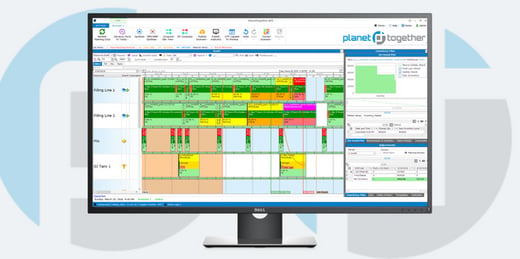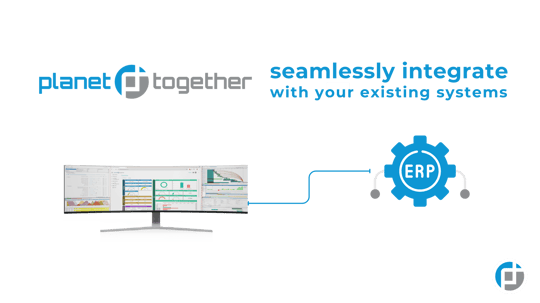
APS in Green Facilities: Aligning Operational Scheduling with ESG Goals
In the modern era of food and beverage manufacturing, success is no longer measured solely by production volume, efficiency, or profit margins. Today’s leading manufacturers are increasingly judged by their environmental, social, and governance (ESG) performance. As consumer expectations, investor pressures, and regulatory requirements grow, Operations Directors face a new challenge: how to integrate sustainability into daily operations while maintaining competitive performance.
One powerful solution emerging in this landscape is Advanced Planning and Scheduling (APS) systems, particularly when integrated with enterprise platforms like PlanetTogether and ERP giants such as SAP, Oracle, Microsoft Dynamics, Kinaxis, or Aveva. By leveraging APS technology, food and beverage manufacturers can align their operational scheduling with ESG goals, driving both sustainability and profitability.
This blog explores how APS tools contribute to green facility operations, how integration enhances their value, and why Operations Directors must put APS at the center of their ESG-aligned strategies.

Why ESG Matters in Food and Beverage Manufacturing
ESG goals cover three broad pillars:
Environmental — energy use, water consumption, emissions, packaging waste, and supply chain sustainability.
Social — labor conditions, employee wellbeing, community engagement, and product safety.
Governance — ethical leadership, compliance, transparency, and long-term risk management.
For Operations Directors, environmental sustainability often feels most urgent. From cutting energy use on production lines to reducing waste from packaging and raw materials, the pressure to optimize is real — and so are the financial benefits. According to McKinsey, companies that embed ESG into operations can reduce costs by up to 60% through energy efficiency, resource productivity, and waste reduction.
But here’s the rub: ESG success requires precise, data-driven scheduling decisions — exactly where APS systems come into play.

The Role of APS in Green Facility Operations
Advanced Planning and Scheduling systems like PlanetTogether are designed to optimize manufacturing resources across multiple dimensions: machines, labor, materials, and time. In a green facility, these systems extend optimization to environmental and social metrics.
Here’s how:
Energy-Efficient Scheduling
APS platforms model the energy consumption of different machines, processes, and shift patterns. They can identify low-energy production routes, sequence jobs to minimize power surges, and align high-consumption tasks with times of lower energy rates (if variable pricing is in play).
For example, running high-energy ovens or chillers during off-peak hours can significantly cut both carbon footprint and costs.
Waste Reduction
APS systems improve material yield by sequencing production to minimize changeovers and cleanouts. For instance, grouping allergen-free products before allergen-containing runs reduces the need for extensive washdowns — saving water, chemicals, and labor.
By integrating with ERP systems like SAP or Oracle, APS tools access real-time inventory and material tracking, ensuring raw materials are used before expiration and reducing food waste.
Carbon-Conscious Supply Chains
With integrations to platforms like Kinaxis and Microsoft, APS systems gain visibility across inbound logistics and supplier networks. This allows Operations Directors to prioritize local suppliers, consolidate deliveries, and reduce transportation emissions — all coordinated through the production schedule.
Workforce and Social Impact
APS doesn’t just optimize machines; it optimizes human resources. By modeling labor schedules alongside equipment plans, Operations Directors can avoid overwork, ensure fair shift distribution, and enhance worker safety. A socially sustainable plant is one where production targets don’t come at the cost of worker wellbeing.

Why Integration Matters: The Power of Connected Systems
APS systems alone deliver strong benefits, but integration is where the real magic happens. Connecting PlanetTogether APS with leading ERP platforms like SAP, Oracle, Microsoft Dynamics, Kinaxis, or Aveva transforms standalone optimization into enterprise-wide orchestration.
Here’s why integration is critical for ESG alignment:
Real-Time Data Flow — ERP systems provide live data on orders, inventory, supplier performance, and financials. APS taps into this data to make environmentally conscious scheduling decisions that match real-world conditions.
Cross-Functional Alignment — Integrated APS systems ensure that sustainability goals aren’t siloed in the operations department. Finance, procurement, and supply chain teams gain visibility into production impacts, fostering a unified ESG strategy.
Advanced Analytics — With integration, manufacturers can combine APS optimization with enterprise analytics platforms, enabling KPI tracking on energy use, emissions, and labor metrics across the plant and supply chain.
Compliance and Reporting — ESG commitments often require formal reporting to investors or regulators. An integrated APS-ERP setup streamlines data collection and reporting, making it easier to document progress on sustainability goals.
Practical Steps for Operations Directors
To align scheduling with ESG goals, Operations Directors can take the following approach:
Audit Current Operations — Understand your facility’s current energy, waste, labor, and supply chain footprint. What are the biggest sustainability challenges and opportunities?
Define ESG-Driven Scheduling Priorities — Identify where scheduling decisions impact sustainability most: energy use, changeovers, raw material usage, supplier coordination, or labor allocation.
Integrate APS with ERP — Ensure your APS platform (like PlanetTogether) is fully integrated with ERP systems such as SAP, Oracle, or Microsoft Dynamics. This provides the data backbone for sustainable optimization.
Build Sustainability into Scheduling Rules — Configure APS parameters to include ESG priorities — not just throughput and cost. For example, prioritize low-energy production paths, reduce packaging waste, or minimize carbon-heavy logistics.
Monitor and Improve — Use integrated analytics to track ESG metrics over time. Review scheduling performance regularly and refine your strategies to keep pushing toward sustainability targets.

The Future of Green Manufacturing with APS
The shift toward ESG-driven operations is no passing trend — it’s the future of competitive manufacturing. For Operations Directors in food and beverage facilities, success will increasingly depend on the ability to balance performance with environmental and social responsibility.
APS systems like PlanetTogether, when fully integrated with enterprise platforms such as SAP, Oracle, Microsoft, Kinaxis, or Aveva, are the key to unlocking this balance. They transform complex operational data into actionable schedules that cut waste, save energy, protect workers, and meet evolving ESG demands.
In short, APS is not just a tool for operational efficiency — it’s a strategic lever for building the green, resilient, and responsible manufacturing plants of the future.
Operations Directors who embrace advanced, integrated APS solutions will position their food and beverage facilities to lead in the era of ESG. By embedding sustainability into the heart of production scheduling, they can deliver value not just to shareholders, but to employees, communities, and the planet itself.
The question is no longer if APS should play a role in green operations — it’s how fast you can leverage it to drive your ESG success.
Are you ready to take your manufacturing operations to the next level? Contact us today to learn more about how PlanetTogether and integrated scheduling solutions can help you achieve your sustainability goals and drive success in the food and beverage industry.